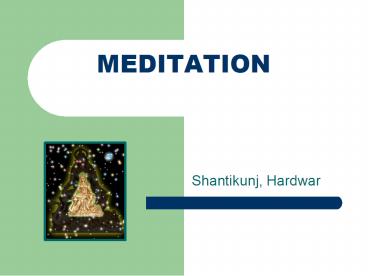MEDITATION - PowerPoint PPT Presentation
1 / 23
Title:
MEDITATION
Description:
The aim of meditation : is to quieten the mind and purge it of its tendencies of ... Meditation is beneficial in day to day life as well as in the pursuit of ... – PowerPoint PPT presentation
Number of Views:287
Avg rating:3.0/5.0
Title: MEDITATION
1
MEDITATION
- Shantikunj, Hardwar
2
MEDITATION
The aim of meditation is to quieten the mind
and purge it of its tendencies of lust, grief,
blinding rage, undue haste, persistent strong
desires for new acquisitions etc.
3
MEDITATION
This is the unique heritage of our Rishis for the
benefit of entire world.
Meditation is beneficial in day to day life as
well as in the pursuit of spiritual
enlightenment.
4
MEDITATION
Advantages of Meditation The meditative quality
of mind helps in proper utilization of available
resources as well as in harnessing the potential
of inner capabilities.
5
MEDITATION
The purpose of meditation is to make the indivi
dual free from his existing problems,
6
MEDITATION
The root Cause of all problems confusion
created by the amnesia of identity of real self
and its role in human life. This amnesia is, h
owever, a case of mistaken identity.
7
MEDITATION
Which result in our behaving like the child
who, while going towards home to meet the mother,
gets so distracted by a carnival on the way, that
it forgets not only about the destination but
also his own name and address.
8
MEDITATION
Man identifies himself exclusively in terms of
his body. The interests and necessities of body
as those of the self In reality body and m
ind are merely two wheels of locomotion provided
by nature to the self for operating the vehicle
of life.
The enigma Individual never thinks about the
driver of the vehicle, which is his soul.
9
MEDITATION
There is no other process known to man for
changing an imbalanced state of mind into a
balanced one than the science of meditation.
10
MEDITATION
Mind is often a helpless victim of various types
of turbulence like anger, grief, sensuality,
revenge and remorse and this condition is prone
to harm ones own self or others.
11
MEDITATION
A constantly troubled mind, in course of time,
becomes cynic or deranged. The solution for
releasing mind from turbulence and make it
accustomed to equanimity lies in meditation.
12
MEDITATION
It is the process of collecting disarrayed
currents of thoughts and concentrating them on a
particular target. In other words meditation i
s the bath to your personality of noble thoughts.
13
MEDITATION
Practice of meditation frees the mind from
purposeless wanderings and channelises its energy
in a focused way.
14
MEDITATION
The aim of meditation is to quieten the mind and
purge it of its tendency, controlling the mind by
preventing it to fall an easy victim to the
onslaughts of lust, grief, blinding rage, undue
haste, persistent strong desires for new
acquisitions etc.
15
MEDITATION
After subjugating its turbulence, mind can be
easily persuaded to work for noble pursuits.
There is a popular saying that the one who has a
control over own mind is capable of controlling
the world.
16
MEDITATION
HARNESSING THE POWERS OF MIND
Mind has a tendency to become attracted towards
profane downgrading activities. Like water, it
tends to flow downwards (inclined to regressive
tendencies). For uplifting water a pump is requi
red. Most of our natural, God-given powers are
wasted in downgrading, retrogressive tendencies.
Meditation serves as the device for reversing th
is common tendency and utilizing the mind for
noble objectives.
17
MEDITATION
With mediation one learns the art of
single-pointed concentration, which elevates the
level of efficiency in any assignment and opens
the right avenues for success.
18
MEDITATION
Meditative Posture Sit with your back erect, b
oth the hands joined in the lap, eyes closed.
Objects of meditation Chosen deity, Early mo
rning rising Sun, Himalayas, Music, Flame etc.
19
MEDITATION
When to meditate Morning time is the best for
meditation, at the time of sun rise other it can
be performed at any time and at any place while
sitting in a office, moving in a bus, studying in
a chamber, Have deep breaths at least for 3
times before sitting for meditation.
20
MEDITATION
Five of the Patanjalis Yoga Sutra describe the
methods and means of achieving tranquility in
mind 1. The mind becomes tranquil by cultivati
ng attitude of (i) friendliness towards the
happy, (ii) compassion towards the miserable,
(iii) joy towards the virtuous and (iv)
indifference towards the evil.
21
MEDITATION
Five of the Patanjalis Yoga Sutra describe the
methods and means of achieving tranquility in
mind 2. The mind also become tranquil by alt
ernately expelling and retaining the breath.
3. When meditation produces extraordinary sense
perceptions, the mind gains confidence and this
helps perseverance.
22
MEDITATION
Five of the Patanjalis Yoga Sutra describe the
methods and means of achieving tranquility in
mind 4. Meditate on the inner light which is
serene and beyond all sorrow.
5, Meditate on one who has attained
desirelessness.
23
MEDITATION
Meditate on the early morning rising Sun
Contemplation on meaning of Gayatri Mantra Im
bibing the sin-destroying TEJ of Savita
Praying to God to compel our intellect towards t
he path of righteousness































